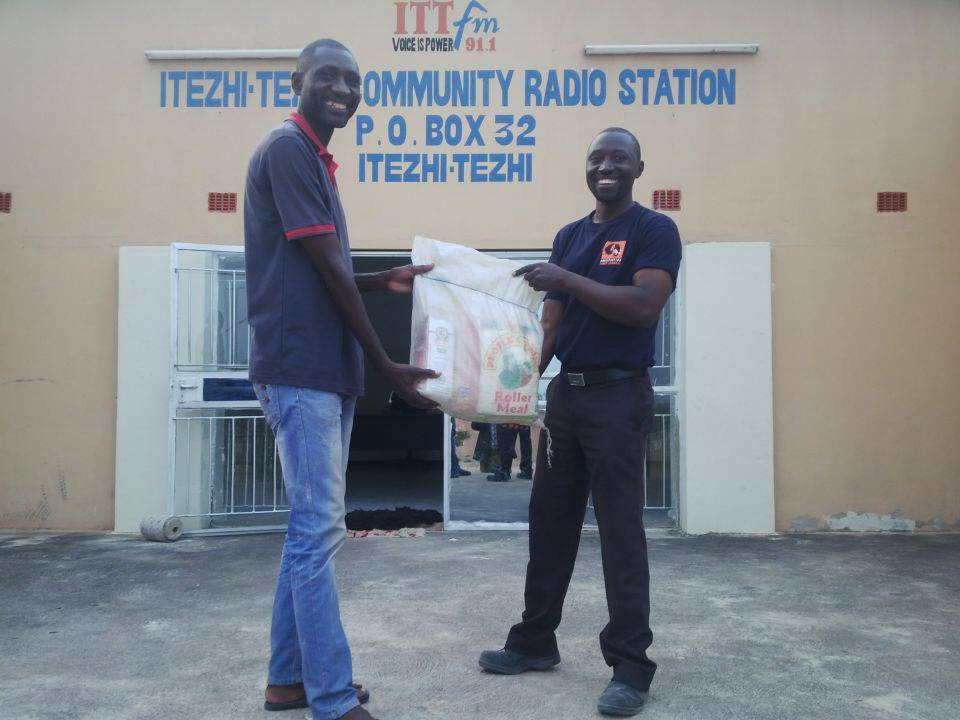
‘My name is Britius Munkombwe and I’m 37 years old. I was born in Zambia and have lived here my whole life.’
‘I have a Grade 12 level education and am currently studying for a diploma in Project Management. I have received comprehensive training in community mobilisation, community based natural resource management, human elephant conflict mitigation, and various HIV /AIDS interventions.
As Game Rangers International‘s District Community Officer, I design, implement and manage community outreach projects in Itezhi-Tezhi District. I’m passionate about community development and conservation.’
We chatted with Britius to uncover his story about Conservation Radio, a project—supported by National Milling Company (NMC)—that’s helping save Zambia’s wild animals through the airwaves.
How did you get involved with Game Rangers International?
I used to work alongside Game Rangers International when I was with the Community Resources Board, so I knew about the excellent conservation work they were doing in Kafue National Park (KNP). When my term of office with the CRB expired, I applied for work with GRI. I started in the role of community liaison officer, then took up the responsibility of Project and Camp Manager. I am now District Community Officer, for the whole of ITT, a district with a population of approximately 60,000 people.
How did Conservation Radio come about?
‘Conservation Conversations’ started as a result of a pilot show to sensitise people to issues of conservation in the area. Because ITT is adjacent to Kafue National Park, most listeners live in the Game Management Areas so it’s important for them to learn about conservation, and engage in discussions about the issues that are effecting their natural resources. ITT FM enjoys a monopoly—there are no other radio stations in the district.
What is your set up like?
Conservation Conversations is an hour-long show that broadcasts weekly. Call lines are always open so that listeners can ask questions. At the end of each month we present a question, and deliver a hamper to the listener who calls in with the correct answer. Topics include human elephant conflict, community livelihoods, traditional conservation aspects.
The station is in the centre of ITT Town. I present in a live broadcast studio, while the mission controller works from Studio 2. In the live broadcast studio there is a round table, with four microphones so that I can invite guest speakers. There are also rooms for recording and editing the shows. The station has power and water and recently acquired internet.
When I am not at the radio station, I work from Shanangoma—a remote village scout command centre in the Nkala GMA. It is an area of high human-elephant conflict and very isolated—the nearest village is 4km away, across the plains. I have my own office at Shanangoma with power and internet. I have temporary accommodation of a tent, but we don’t have access to water yet.

Why was there a need for a conservation themed radio channel?
Listeners live adjacent to the Game Management Area and Kafue National Park, which is badly affected by human elephant conflict, poaching, illegal bushmeat trade and over fishing. The goal of the radio show is to try to get the communities to take responsibility for protecting their natural resources and understand the rules and regulations. It is a channel for the community to express their views on regulations and a platform for us to give out valuable information.
What do you talk about on your show?
I talk about a variety of conservation issues. Recent shows have included elephant orphan response protocol, the cultural heritage of wildlife in the district, benefits of wildlife in the area, hunting legislation and park regulations and endangered species. I present in both the local language and English.
How do you think your broadcasts are helping the conservation work of Game Rangers International?
The show has been very successful. Orphaned elephants have been rescued through Conservation Conversations because people now know how to identify an orphaned elephant and who to contact. People in this area understand the overall work of GRI, and communities have been mobilised to participate in conservation activities.
Are there any examples of when your radio programme has contributed directly to conservation?
The rescue of several orphaned elephants. Listeners reporting the poisoning of baboons and calling for the Department of National Parks and Wildlife to intensify operations. Licensed fishermen reporting illegal fishing activities occurring on Lake ITT.

What will you consider a successful result from this project?
We know that people are reporting more as a direct result of the show. I think that a positive mindset of the listeners has been achieved. The radio station has assessing mindset and have deemed my show successful. We are now reaching 30,000 people in six districts, and with up to 35 listeners calling in each week we know people are engaged.
Is there anything else you’d like to say or add?
I would love to see this programme continuing as it is constantly reminding the communities about conservation. People now recognise me in the street and try to engage me in conversation—people are really getting excited about conserving KNP.
Would you like to know more about Game Rangers International? Why not check out our Causes Page, or alternatively have a read of these articles:
Meet the NGO protecting Zambia’s orphaned elephants
Meet Muchichili, the newest orphan at the Lilayi Elephant Nursery
